IDF 2010 。Intel Fellow(院士)
作者 陈怀临 | 2010-09-12 20:43 | 类型 行业动感 | 13条用户评论 »
|
【陈怀临注:Intel的院士。基本上是一个顶级的科学家称号。通常人们认为,一个Intel的Fellow可以去许多学校做教授。但反之不然。。。每次IDF的时候,Intel都会让这些大牌们出来散散心,与大家交流交流。。。明天开始的IDF 2010,会有如下的院士们出场。】 Intel Fellows: Live and Uncensored!  Moderator:
Intel Fellow, Technology and Manufacturing Group Director, Storage Architecture Intel Corporation Other Intel Fellows participating in the Intel Fellows: Live and Uncensored! include:
 Thomas A. Piazza Thomas A. Piazza
Intel Fellow, Intel Architecture Group Director, Graphics Architecture Intel Corporation  Raj Yavatkar Raj Yavatkar
Intel Fellow, Intel Architecture Group Director, System–on–Chip Architecture Intel Corporation  Ajay V. Bhatt Ajay V. Bhatt
Intel Fellow, Chief Client Platform Architect Intel Architecture Group Intel Corporation  Neal R. Mielke Neal R. Mielke
Intel Fellow, Technology and Manufacturing Group Director, Reliability Methods Intel Corporation  Kevin Kahn Kevin Kahn
Intel Senior Fellow, Intel Labs Director, Communications Technology Lab Intel Corporation  P. Geoffrey Lowney P. Geoffrey Lowney
Intel Fellow, Software and Solutions Group Chief Technology Office, Developer Products Division Intel Corporation
| |
雁过留声
“IDF 2010 。Intel Fellow(院士)”有13个回复










看到几个印度人
Radia Perlman从SUN去Intel了,难道Intel没有给个Fellow的title,人家在SUN可已经是Fellow了。
Intel目前有四十八个院士,Radia是其中的一个。从名字来看,印裔的应该有25%左右。另外,Intel还有十个Senior Fellow,看起来fellow的头衔略有些泛滥,似乎尚不如Cisco的珍贵(大概10人左右)。华裔的fellow从姓氏判断大概只有两个人,所以华人还是需要努力啊。
中国人确实不如印度人在美国混的吃香。要recognize这一点。不仅仅是语言问题。
华为也应该搞Fellow制度。军衔对等。
AMD的Fellow更泛滥…
听印度人讲英语的时候有一种“口吃”的感觉。
Chia-Hong Jan
Intel Fellow, Technology and Manufacturing Group
Director, System-on-Chip (SoC) Technology Integration
INTEL CORPORATION
Chia-Hong Jan is an Intel Fellow and director of system-on-chip (SoC) technology integration for the Technology and Manufacturing Group. In this role, Jan manages 32nm and 22nm process technologies for all of Intel Corporation’s SoC products, including ultra low power mobile Internet devices, netbook processors, consumer electronics products, embedded products, wireless communication applications and chipset/graphic processors.
Since joining Intel in 1991, Jan has held a number of technical and management positions in Portland Technology Development for 0.8um, 0.55µm, 0.35µm, 0.25µm, 0.18µm, 0.13µm, 90nm, 65nm, 45nm, 32nm and now 22nm advanced CMOS technology development. He was the rapid thermal processing (RTP) and advanced silicon deposition (ASD) group leader, working on the development of novel salicide technology, advanced gate oxide processes, source/drain junction engineering and epi SiGe technology for strained silicon. He led the team that spearheaded the integration of new salicide materials, including titanium (0.55µm), cobalt (0.18µm) and nickel into the basic logic CMOS process. He was the 90nm interconnect integration manager, and his team was the first in the industry to successfully integrate low-k ILD materials for high performance microprocessors. He was also the program manager for the 65nm low-power chipset process technology and 45nm SoC process technology for Intel® Atom™ processor 朾ased low-power products, which were the first in industry to deploy the innovative high-k/metal gate technology on SoC.
Jan holds 37 U.S. patents in the fields of semiconductor manufacturing process and integration. He has published more than 40 technical papers related to CMOS processing technology. Jan has received three Intel Achievement Awards and is the recipient of the 2008 Distinguished Achievement Award of the College of Engineering at the University of Wisconsin-Madison.
Jan received his bachelor’s degree in chemical engineering from National Taiwan University in 1982. He also earned his MBA from National Taiwan University in 1986. He then earned his master’s degree and Ph.D. in materials science from the University of Wisconsin-Madison in 1988 and 1991, respectively.
是一个伪台大的弟兄。不知Intel有没有大陆出来的优秀学子能混到Fellow的级别。不过优秀学子估计都是优秀工程师:-)。马云,李彦宏,任正非好像都与“优秀学子”靠不上谱:-)
大陆的教育体制决定了出不了talent, 只能出优秀的engineer! 悲哀
什么都能往体制上扯,基因决定论?
环境决定论
to 51sky:
我不同意,像HP这样的美国联想都能出Vinay这样的牛人,说明最重要的是看天赋:)
相对而言,在美国的印度人比中国人更有自信,出身比较好。从大样本而言,家境出身好的人比较有大志向,例如,毛润之。
在美国的中国人,特别是硅谷的工程师们,恰恰不是所谓家境特别好的人。那些人要么在现在的北京,上海,或者在LA和温哥华。。。(二奶村,BTW)。
家境不好的集合的人会非常容易的满足对自己的要求。。。
印度人不一样:They feel that they have the responsibility to influence the company that they are working for; they believe that they are the selected ones who can change the community…
大多数老中呢?
我就是一个打工的,公司好坏关我屁事。。。(我认为广东,香港文化对中国人的毒害非同小可。打工一词非常猥琐。典型的广东香港一带small business owner的心态。 在北方语系里绝无打工一词。)